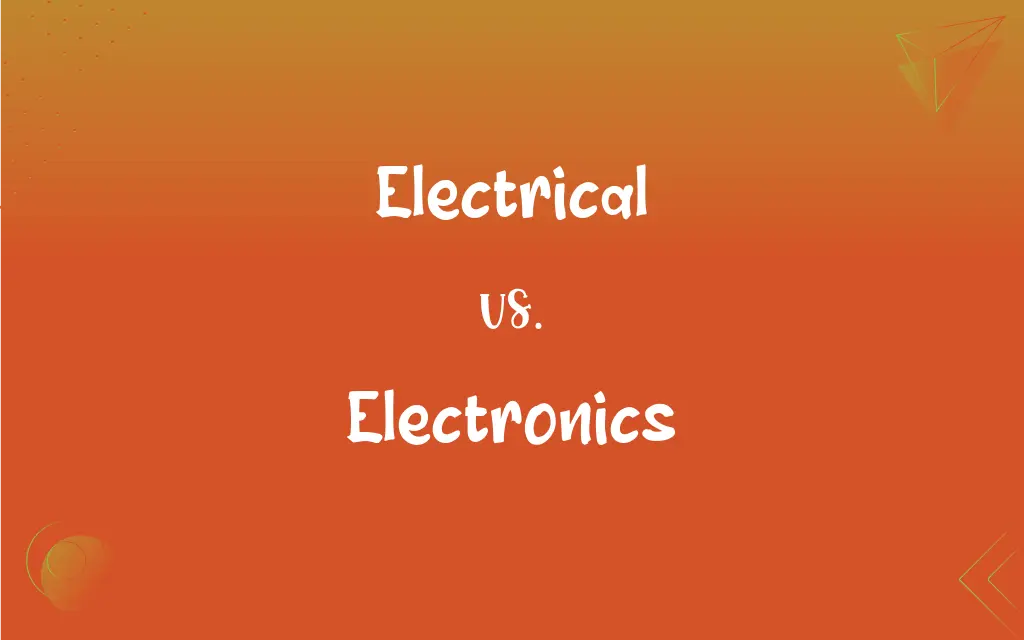Electrical vs. Electronics: What's the Difference?
Edited by Aimie Carlson || By Harlon Moss || Updated on October 10, 2023
Electrical refers to the broad field involving electricity, its uses, and applications in general. Electronics is a subset of electrical, dealing specifically with circuits, devices, and systems that manage the flow of electrons.

Key Differences
Electrical is an encompassing term that denotes anything pertaining to electricity and its applications. The electrical field covers a broad spectrum, which includes power generation, transmission, and motor control. Electronics, however, zeroes in on the detailed aspects of manipulating and managing electrical energy. The specific control of electron flow is the crucial factor that demarcates electronics from the broader electrical umbrella.
Electricians, electrical engineers, and related professionals work with electrical systems, focusing on ensuring that power is transmitted and distributed safely and efficiently. This includes dealing with high power systems, electrical grids, motors, and other heavy-duty applications. Contrarily, electronic engineers and technicians typically work with low power devices like integrated circuits, transistors, and microcontrollers, aiming to manage and control the electron flow within devices.
Electrical circuits, commonly dealt with in the electrical field, tend to manage high power and are prominently featured in industrial machinery, home wiring, and power transmission systems. These circuits are chiefly designed to perform work, like moving a motor or illuminating a light. Electronics deals with circuits that control and modulate the electrical signal, often utilizing these signals to convey information, like in the cases of computers, communication devices, and sensors.
Safety protocols in electrical applications frequently address the risks associated with high power, such as electrical fires, electrocution, and system failures. While safety in electronics also concerns avoiding shocks and managing failures, it tends to be closely tied with data protection and signal integrity due to the information processing aspect of electronic devices. Both fields, while interconnected, have distinct focuses and applications, weaving a vast tapestry of technological advancement.
Comparison Chart
Primary Focus
Power generation and distribution
Control and management of electron flow
ADVERTISEMENT
Typical Power Levels
High power (kilowatts to megawatts)
Low power (watts to milliwatts)
Primary Applications
Motors, power grids, lighting
Computers, communication devices, sensors
Component Examples
Transformers, generators
Transistors, microcontrollers
Associated Risks and Safety
Electrical fires, electrocution
Signal integrity, data protection
Electrical and Electronics Definitions
Electrical
Related to devices, systems, or installations that operate using electricity.
The electrical tools are stored safely to prevent any accidents.
ADVERTISEMENT
Electronics
Pertaining to electronic components, circuits, and systems used for computing, communication, and other applications.
He owns a shop that sells electronics in the city center.
Electrical
Concerned with the generation, transmission, and utilization of electric power.
The city is developing a new electrical grid to meet future energy demands.
Electronics
The science dealing with the development and application of devices and systems involving the flow of electrons.
The field of electronics has evolved rapidly over the past few decades.
Electrical
Involving electrical power as a determining factor or element.
All electrical appliances must meet certain safety standards.
Electronics
Devices or systems created to control, manage, process, or store information via electronic circuits.
She spent the afternoon shopping for new electronics.
Electrical
Working with, produced by, or used for electricity.
The electrical storm caused a lot of damage to the power lines.
Electronics
A branch of engineering that focuses on the practical applications of electron movement and behavior.
He decided to major in electronics at the university.
Electrical
Pertaining to electricity and its applications.
The electrical system in our house is old and needs an upgrade.
Electronics
The study or principle concerning the effects and behavior of electrons in vacuums, gases, and semiconductors.
Electronics plays a vital role in the functioning of modern-day computers.
Electrical
Also e·lec·tri·cal (-trĭ-kəl) Of, relating to, producing, or operated by electricity
Electric current.
An electrical device.
Electronics
(used with a sing. verb) The science and technology of electronic phenomena.
Electrical
Of or related to sound created or altered by an electrical or electronic device.
FAQs
What do electronics engineers do?
Electronics engineers focus on developing, designing, and maintaining electronic systems and components.
Is electronics a branch of electrical engineering?
Yes, electronics is considered a subset of electrical engineering with a specific focus on electronic circuits and systems.
Which deals with higher power levels: electrical or electronics?
Electrical generally deals with higher power levels compared to electronics.
Are transistors used in electronics?
Yes, transistors are fundamental components used in electronics to amplify or switch electronic signals.
What are some safety concerns with electrical systems?
Safety concerns in electrical systems include electrical fires, short circuits, and electrical shocks.
What are some applications of electrical systems?
Electrical systems are applied in power generation, transmission, motor controls, and electrical wiring.
Can electronics control electrical systems?
Yes, electronics often control electrical systems through various control circuits and components.
Which field focuses more on information transfer: electrical or electronics?
Electronics tend to focus more on information transfer through various devices and systems.
What is a microcontroller?
A microcontroller is an electronic device that provides control and management of other devices and systems.
How do electronics impact our daily lives?
Electronics impact our daily lives by enhancing communication, providing entertainment, and enabling smart applications.
What materials are commonly used in electrical circuits?
Materials like copper, aluminum, and insulating materials are commonly used in electrical circuits.
Are integrated circuits a part of electronics?
Yes, integrated circuits are essential components in electronics, enabling compact and efficient electronic systems.
What is the primary focus of electrical systems?
Electrical systems primarily focus on power generation, transmission, and distribution.
What is the role of an electrician?
Electricians install, maintain, and repair electrical systems and ensure they are safe and running efficiently.
What are some common electrical devices?
Some common electrical devices include electric motors, transformers, and generators.
What is meant by power generation in electrical?
Power generation in electrical refers to the creation of electricity through various means like turbines and generators.
Can electronics be embedded in electrical systems?
Yes, electronics can be embedded in electrical systems to provide control and additional functionalities.
What is electrical engineering?
Electrical engineering is a field that deals with the study of electricity, its applications, and its generation and distribution.
What role do electronics play in computing?
Electronics enable computing by managing and processing data through electronic circuits, chips, and microcontrollers.
Is data transmission an application of electronics?
Yes, data transmission is a key application of electronics, especially in communication systems.
About Author
Written by
Harlon MossHarlon is a seasoned quality moderator and accomplished content writer for Difference Wiki. An alumnus of the prestigious University of California, he earned his degree in Computer Science. Leveraging his academic background, Harlon brings a meticulous and informed perspective to his work, ensuring content accuracy and excellence.
Edited by
Aimie CarlsonAimie Carlson, holding a master's degree in English literature, is a fervent English language enthusiast. She lends her writing talents to Difference Wiki, a prominent website that specializes in comparisons, offering readers insightful analyses that both captivate and inform.































































